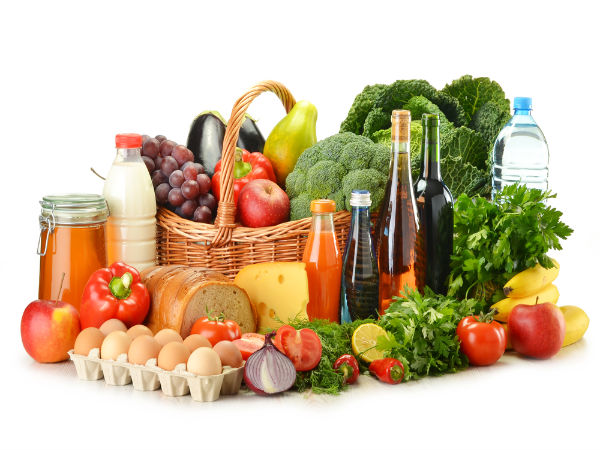Just In
- 1 hr ago

- 7 hrs ago

- 9 hrs ago

- 12 hrs ago

Don't Miss
- Sports
 Pakistan vs New Zealand: Why Azam Khan Is Essential For Pak's T20 World Cup Squad?
Pakistan vs New Zealand: Why Azam Khan Is Essential For Pak's T20 World Cup Squad? - Movies
 When Karan Johar Revealed Sara Ali Khan And Janhvi Kapoor Once Dated Siblings On KWK 7, Guess Who?
When Karan Johar Revealed Sara Ali Khan And Janhvi Kapoor Once Dated Siblings On KWK 7, Guess Who? - Finance
 Reliance, ONGC, Tata, Adanis: Energy Stocks Didn't Get The Memo Of Bears, Up 12% In 30-Days; 10 Stocks To BUY
Reliance, ONGC, Tata, Adanis: Energy Stocks Didn't Get The Memo Of Bears, Up 12% In 30-Days; 10 Stocks To BUY - News
 Trust Of The Nation 2024: PM Modi Is Poised For A Resounding Victory, Shows Dailyhunt Survey
Trust Of The Nation 2024: PM Modi Is Poised For A Resounding Victory, Shows Dailyhunt Survey - Automobiles
 Suzuki Swift Hatchback Scores 4 Star Safety Rating At JNCAP – ADAS, New Engine & More
Suzuki Swift Hatchback Scores 4 Star Safety Rating At JNCAP – ADAS, New Engine & More - Education
 NLSIU Announces the Rajiv K. Luthra Foundation Grant
NLSIU Announces the Rajiv K. Luthra Foundation Grant - Technology
 Dell Introduces AI-Powered Laptops and Mobile Workstations for Enterprises in India
Dell Introduces AI-Powered Laptops and Mobile Workstations for Enterprises in India - Travel
 Journey From Delhi To Ooty: Top Transport Options And Attractions
Journey From Delhi To Ooty: Top Transport Options And Attractions
Healthy Minerals Your Body Needs
Minerals play an essential role in nutrition. Minerals aid the human body in performing its various day-to-day functions. As these essential minerals are not produced by the body, they need to be consumed as part of our regular diet. Without these healthy minerals your body will be susceptible to a number of diseases. Mineral deficiencies will result in diseases like anaemia, thyroid dysfunction, osteoporosis or problems in sexual maturation, to name a few.

Given below are the most important healthy minerals your body needs.
Iron: Iron is one of the most important minerals as it is required for energy metabolism. It helps in the production of red blood cells that carry oxygen throughout the body. Iron is also required by the immune system for its functioning. The main sources of iron are red meat, fish, poultry, shellfish, egg yolks, legumes, dried fruits and dark leafy greens. Deficiency in iron causes fatigue, dizziness, hair loss and impaired immune function.
Calcium: It is the most abundantly present mineral in the body. Calcium helps in building strong bones and teeth. It also helps in nerve transmissions, regulating blood pressure, muscle function and hormone secretion. The best sources of calcium are milk, dairy products, spinach and kale. Calcium deficiency leads to osteoporosis or brittle bones and tetany, which causes muscle cramps, numbness and tingling in limbs.
Magnesium: This mineral is mainly found inside muscles, soft tissue and bones. It is needed for making protein, building strong bones, muscle contraction and nerve transmission. Magnesium keeps the immune system healthy and functioning properly. The main sources of magnesium are lettuce, spinach, green beans, meat and kidney beans. Deficiency in magnesium can cause nausea, muscle cramps, high blood pressure and heart palpitations.
Potassium: Potassium is required by the body to regulate blood pressure, build proteins, and use carbohydrates, maintain the pH balance of the blood and support normal growth. Food sources rich in potassium are beef, fish, raisins, bananas, cantaloupe, potatoes and tomatoes. Potassium deficiency causes hypokalemia, the symptoms of which are muscle cramps, paralysis and abnormal heartbeat.
Zinc: This mineral is essential for chemical reactions in the body. Zinc is present in organs, body secretions, tissues and fluids. It is essential in keeping your immune system healthy. It fights against infections and accelerates the healing of wounds. Zinc can be obtained from the consumption of beef, chicken, eggs, nuts, whole grains, dairy products, and oysters. Deficiency in zinc causes anorexia, aggravates pneumonia and diarrhoea and affects the health of the mother and foetus during pregnancy.
These healthy minerals are needed by our body to function normally. Hence, we must ensure that our diet consists of food rich in these minerals.
-
 wellnessDeficiency Of These Vitamins And Minerals Can Cause Insomnia
wellnessDeficiency Of These Vitamins And Minerals Can Cause Insomnia -
 diabetesWorld Chocolate Day 2021: Are Chocolates Good For People With Diabetes?
diabetesWorld Chocolate Day 2021: Are Chocolates Good For People With Diabetes? -
 wellnessDiet And Depression: Healthy Foods That May Help Fight Depression
wellnessDiet And Depression: Healthy Foods That May Help Fight Depression -
 wellnessSea Salt: Health Benefits, Risk Factors And Uses
wellnessSea Salt: Health Benefits, Risk Factors And Uses -
 nutrition6 Essential Nutrients To Include In Your Diet
nutrition6 Essential Nutrients To Include In Your Diet -
 nutrition10 Health Benefits Of Turnips, Nutrition, Recipes And Caution
nutrition10 Health Benefits Of Turnips, Nutrition, Recipes And Caution -
 nutritionPulses: Types, Nutritional Benefits And Side Effects
nutritionPulses: Types, Nutritional Benefits And Side Effects -
 wellness10 Vitamins and Minerals That Help Boost Your Sex Drive
wellness10 Vitamins and Minerals That Help Boost Your Sex Drive -
 nutrition11 Health Benefits Of Coconut Vinegar You Probably Didn't Know
nutrition11 Health Benefits Of Coconut Vinegar You Probably Didn't Know -
 nutrition10 Health Benefits Of Eating Brown Sugar
nutrition10 Health Benefits Of Eating Brown Sugar -
 nutrition12 Healthy Facts About Carrots You Didn't Know
nutrition12 Healthy Facts About Carrots You Didn't Know -
 nutritionWhy Foods Rich In Chlorophyll Are Healthy
nutritionWhy Foods Rich In Chlorophyll Are Healthy


 Click it and Unblock the Notifications
Click it and Unblock the Notifications



